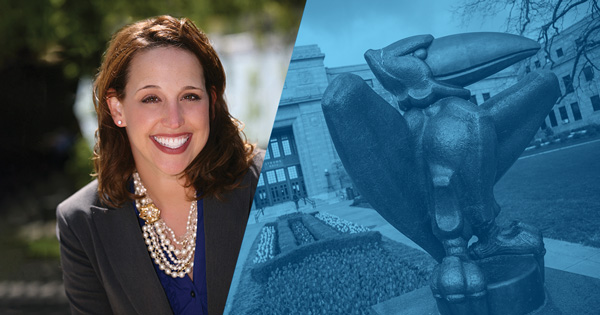Pro Bono Impact: Helping families in need

Pro bono guardianship clinic assists Johnson County families
Carly Boothe volunteers with several organizations that work with families who have adult children with disabilities. The organizations always have a long list of families that need guardianships.
To help meet that need, Boothe, L’06, launched a pro bono project with KU Law students in fall 2021. The Guardianship Assistance Program of Johnson County helps low-income families navigate the process of obtaining legal guardianship of their adult children with disabilities.
The process requires two nonrelated attorneys — one to represent the proposed guardians, one to represent the proposed ward. Non-contested guardianships can cost families $1,500 or more in attorney’s fees, Boothe said.
“The parents of adults with special needs are often isolated and financially drained due to one of the parents being unable to work if their loved one cannot stay home alone,” Boothe said.
Now in its second year, the program has helped 14 families obtain guardianship of their adult children with disabilities. Eighteen KU Law students have volunteered, committing dozens of pro bono hours since the pilot program launched. Students also volunteer for a guardianship program in Wichita.
For Boothe, pro bono work is a way to use her legal education to give back to her community.
“Everyone on this planet has gifts of some sort, and so what can we do to utilize those gifts? And for me, I can be in the courtroom,” Boothe said.
Recognizing her work with the guardianship assistance program, the Kansas Bar Association gave Boothe a Pro Bono Publico Award during the 2022 KBA Annual Meeting.
The guardianship program is a collaboration with the Johnson County Bar Association, Johnson County Developmental Supports, Kansas Legal Services and KU’s Public Interest Law Society. Boothe — who specializes in family law and mediation services through her firm, Boothe Walsh Law & Mediation — is a regular volunteer with several of the participating groups.
KU Law students volunteering for the program attend a virtual Guardianship 101 training. They work with mentor attorneys to conduct interviews, then draft pleadings based on those interviews. Students have a chance to attend a court hearing virtually, while mentor attorneys present the findings.
“I wanted this to be a hands-on program for the law students, so they could conduct actual client meetings, complete the necessary investigation and draft the required paperwork,” Boothe said. “I also wanted to introduce this really rewarding area of law to students so they realize the level of impact we attorneys can have.”
Law student Rachel Henderson volunteered for the program to get experience in family law.
“Providing free legal services to low-income clients is incredibly rewarding. The clinic has played a part in preparing me for my career and has allowed me to make a difference in my community,” Henderson said.
Students told Boothe that they enjoyed hearing about each family's advocacy to “try to maximize the quality of life for these young adults,” Boothe said. Students approached those conversations respectfully, honoring the humility of the situation, she said.
“I think hearing about a forgotten part of our population, an ignored part of our population, was impactful,” Boothe said. “They really honored the conversations with the families.”
— Article by Margaret Hair, with reporting by Sydney Halas
This article appeared in print in the 2022 KU Law Magazine.